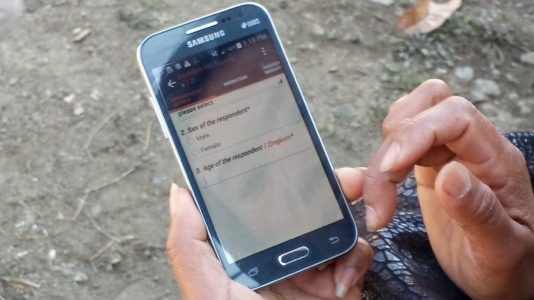‘An amazing initiative. Using Akvo FLOW is very easy and its use will make our work less cumbersome, quick and will also help us to reach the farthest villages, thus enable us to involve the most vulnerable people’ said Ms.Sophie, data enumerator, FXB India Suraksha
With an effort towards improving people’s quality of life by developing knowledge on local conditions to customize programme activities and provide an information base against which to monitor and assess the progress and effectiveness of our anti trafficking activities FXB India Suraksha (FXBIS) has taken a step forward by utilizing Akvo FLOW for improved information collection & dissemination through online mobile based research technology in Manipur.
FXB India Suraksha in collaboration with ECPAT Luxembourg, launched an anti trafficking intervention programme MUKTI in Manipur state, India in October, 2015. A comprehensive community-driven intervention the project that will help to empower women, local communities and district administration and build their capacities to effectively counter human trafficking.
Manipur is emerging as a major transit point for cross-border human trafficking and other forms of organized crime from Southeast Asia. Using a bottom up approach MUKTI aims to reduce vulnerabilities of 30,000 women and children towards human trafficking, especially for the purpose of commercial sexual exploitation over a period of three years. As a part of this process a four day Enumerators’ Workshop was conducted between 11- 14th February, 2016 in Ukhrul, Manipur.
The workshop was divided into two parts: theoretical and practical
On the first day enumerators were briefed on the background and plan of the survey, basic information on human trafficking in general and within the region, ethical considerations and obtaining of consent form, the questionnaire and how to use the Akvo FLOW system. Baseline research methodologies were discussed on the second day , which included simulation exercises on how to download and use the app. To put their training to a test the enumerators undertook a field testing of the questionnaire. To make the research and survey an inclusive process the fourth day of the workshop was dedicated to a feedback session with enumerators and project team.
This workshop acts as a precursor to an in depth baseline study assessing the human trafficking situation in Manipur, with a focus on the two districts of Imphal and Ukruhl. It will also review the states and civil society organizations’ response to human trafficking on a national, state, district and block level. The research findings will be disseminated in the form of a report to all relevant stakeholders and is expected to improve anti human trafficking prevention mechanisms in place and make recommendations wherever required.

Akvo Flow is a multi-language tool for collecting, evaluating and displaying any quantity of geographically referenced data. The system uses a simple Android smart phone app and an online dashboard. It helps map situations on the ground and monitor changes over time. It dramatically improves the accuracy of data and makes it easier to gather and share by using the best available tool for this purpose – the smart phone. This smart technology is very handy to continuously assess the quality, quantity and accessibility of water in remotest areas. The online questionnaire survey is downloaded via the app on the smart phone. The data is directly entered using the app and uploaded to the online dashboard after completing and submitting the survey form. Further digitization of the data is therefore not required given that the data are immediately accessible remotely after submitting the questionnaire. Akvo FLOW is specially designed to work in diverse locations that are often remote or lacking reliable basic infrastructure. Since the first version was introduced in 2010 by US NGO Water for People, it has been proven in use around the world by teams tasked with ensuring development activity, infrastructure and services are working.
ICTs are being widely used to publicize and disseminate public education campaigns and online training initiatives on human trafficking.
The United Nations “Convention against Transnational Organized Crime (UNTOC)”states that Computer-based e-training on identifying and responding to human trafficking is provided for law enforcement personnel. Sharing of information between government, nongovernmental, and private sectors is key successful implementation of anti trafficking technologies.
However most interventions are a redressal mechanism only and does not address the potential victims in high risk areas. To rectify this approach FXB seeks to utilize the latest research in technology in order to ensure that tools are user centric and refined over time to most effectively respond to shifts in technology and trafficking. A pilot model which will help policy makers and officials in effective planning, implementing and monitoring of government schemes with increased community participation.
